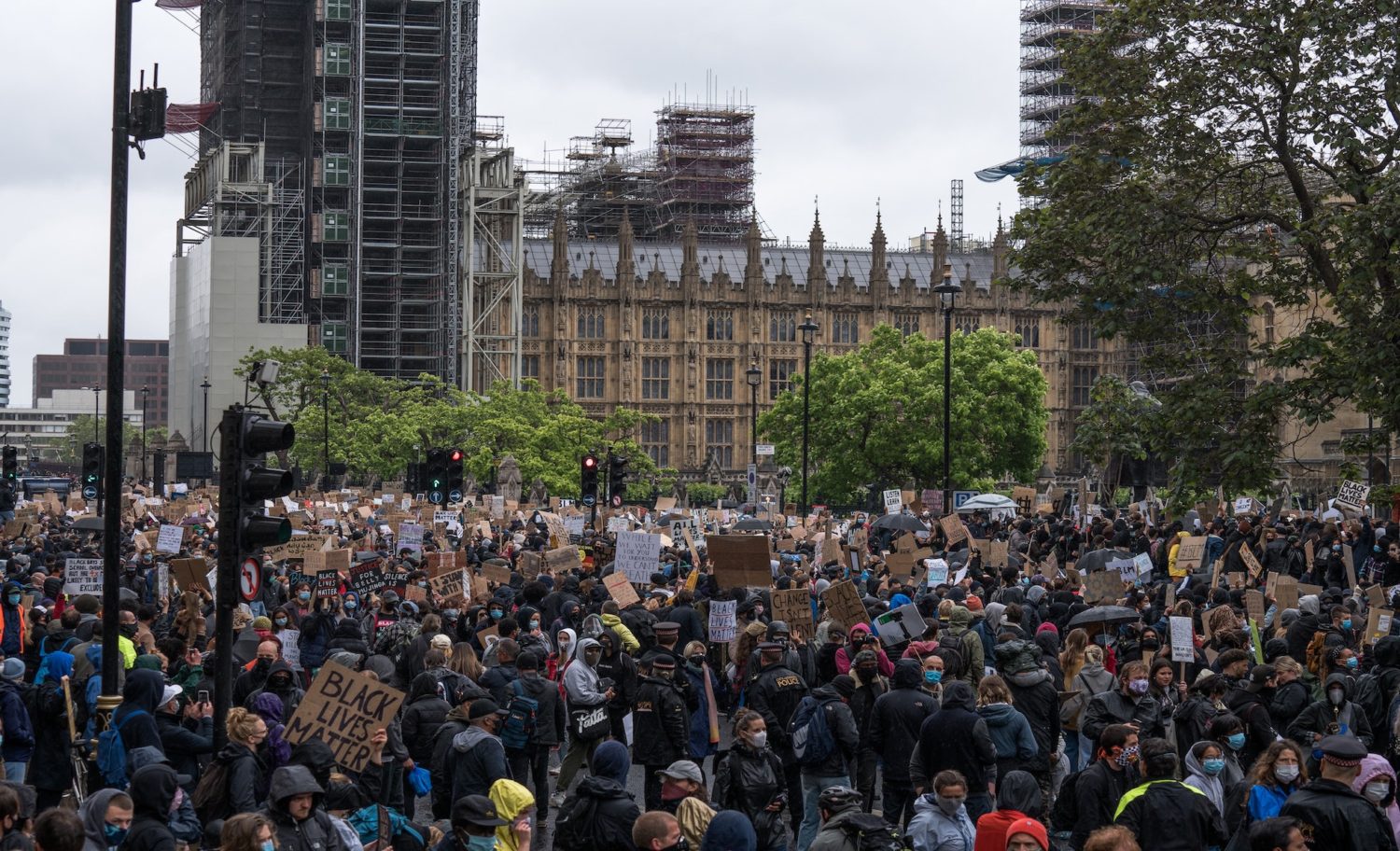Work to do
Shadow equalities minister Marsha de Cordova talks to Vanesha Singh about the party’s response to Black Lives Matter and why language matters in the fight against racism.
This has been a year when racial injustice and widening inequalities have become harder to ignore, owing both to the coronavirus pandemic and the Black Lives Matter (BLM) uprising. The murder of George Floyd by white police officers in the United States brought to the fore issues of institutional racism, policing and white privilege, with protesters in Britain’s cities, towns and villages joining the global movement. Tens of thousands of people across the UK, including shadow secretary of state for women and equalities, Marsha de Cordova, protested in solidarity. “For me, it was personal. And it really cut deep … because that could have been my brother, it could have been my nephew.”
As the MP for Battersea, home to the United States embassy, de Cordova’s constituency became a focal point for the protests. “Seeing thousands of people from all different walks of life and all different backgrounds coming together, demanding fundamental change, we were challenging the racial injustice that exists in this country. Because I think it’s important to highlight that whilst we were showing solidarity with what happened in the US, it’s also about recognising and knowing the problems that we face here.”
And there is indisputable evidence of the persistent inequalities black people in Britain face. “When you think that a black worker with a degree will earn 23 per cent less than their white counterparts, that’s unjust. Black Caribbean children or children that are mixed are three times more likely to be excluded from school, that’s unjust as well. And if you look at our criminal justice system, there is a huge element of disproportionality there. You are nine times more likely to be stopped and searched if you are a black person,” she says. “We’re living in such a racially unjust society. And for me, it’s so important that we cannot let this moment pass, let any of the momentum fade away.”
Like many, she found the government’s response to the BLM protests ‘disappointing’. “This was a real opportunity for the government to step up to the plate. But for the prime minister to announce yet another commission to look at racism and discrimination isn’t the kind of action that was needed.”
The move provoked de Cordova to look into the numerous government-led reviews, commissions and reports on racial injustice over the last three years: the McGregor Smith report on race in the workplace; David Lammy MP’s review on discrimination in the criminal justice system; the Angiolini report into deaths in custody; Edward Timpson’s review on school exclusions; the recent Windrush Lessons Learned review and two Public Health England reports that came out this June. Each had numerous recommendations. “And I kid you not when I say, how many of those recommendations have been implemented? Little over a few to say the least, and the only ones that have been are from the Lammy review. All the others, nothing has been implemented. So I don’t think another review is going to really help us.”
Instead, she has called for the government to implement a number of policies. “One of the things I believe we need is a race equality strategy that seeks to fundamentally change some of the systems and institutions where these racial injustices exist.”
Another top priority for de Cordova is reforming the national curriculum so it includes ‘an honest account’ of colonialism and the transatlantic slave trade. And on her return to parliament this September, she wrote to the prime minister to introduce mandatory ethnicity pay gap reporting from next April. “Then we will be able to hold companies to account and highlight any disparities that exist within the workplace.”
In order to better address racial and socioeconomic inequality in the UK, de Cordova has decided to reject acronyms like ‘BME’ or ‘BAME’ (black, Asian and minority ethnic), and ‘POC’ (people of colour) which homogenise all non-white ethnic groups. “We’re different and our experiences are going to be different.” She joins a growing number of people using nuanced and direct language around ethnicity. “Language is important,” she says. “I am a black woman, that’s it, I’m not anything else.”
She places Labour, with its ‘proud history’, at the forefront of the fight for fairness, equality, inclusion and antiracism. “In 2017 and 2019, we were the only party to have manifestos for disabled people. We have a race and faith manifesto as well. We have a strong track record of fighting for the rights of LGBTQ+ communities. It’s all been done by the labour movement.”
Clear, too, is her faith in Labour’s new leader, Keir Starmer, who she says is ‘incredibly committed’ to ensuring Labour represents ‘all communities’. But this summer, Starmer was heavily criticised for dismissing BLM’s calls to ‘defund the police’ in Britain as ‘nonsense’. This came on top of accusations the party has been too slow to act on anti-black racism, in response to behaviour towards black MPs by former staff cited in the leaked Labour antisemitism report. It led to swathes of members – particularly black members – feeling angry and wanting to leave the party
De Cordova agrees the party ‘absolutely’ has ‘work to do’ on tackling anti-black prejudice and other forms of discrimination, which she stresses existed long before Starmer became leader. But she insists the answer is not to leave. “My message to members is, if you feel like walking away, think again, don’t walk away. You stay and you fight. You fight for what’s right,” she says. “I think as black members, we need to self-organise, which is what is happening, and people are doing that. And we need to hold the leadership to account, whether that’s the general secretary or the leader of our party, because no form of racism, anti-black racism, antisemitism, should have any place in our party or our movement.”
Going forward, de Cordova believes it is vital Labour maintains its radical policy agenda, but that during these early stages under Starmer, the initial steps are for the leadership to ‘listen to all different communities’, and ‘rebuild trust’, particularly with those parts of the country that chose not to vote for the party in 2019. “There is no question that Labour has a mountain to climb. But ultimately it’s really up to us as Labour in opposition to have a strong and bold, clear message [about] this government’s incompetence … We need to continually be calling the government out for not caring and understanding what needs to be done to tackle the rising inequalities that we face.”
Indeed, Covid-19 has exposed how unequal we were coming into the crisis and exacerbated that inequality further. “For me, from an equalities perspective, since this whole pandemic, we’ve seen an over-representation of impact on women, and on our black, Asian and minority ethnic communities, and also on young people and older people.”
Looking, then, at Boris Johnson’s handling of the coronavirus crisis, de Cordova recalls ‘so many examples’ of ineptitude that have subsequently led to the UK having one of Europe’s highest numbers of Covid-19 deaths. “At every stage I think this government has failed to really prepare and protect us and also to lead us through to any sort of recovery,” she says.
The government – which de Cordova describes as ‘incredibly right wing’ – does not have a ‘credible plan’ for the looming unemployment crisis and has also been failing in its public sector equality duties to carry out comprehensive equality impact assessments, aside from those it produced on legislation passed in April. “And that’s really worrying,” she says, “because even when the chancellor announced his economic support package, there was no impact assessment carried out on any of that. And that also gives you an insight into their thinking.”
Its failure to consider the human impact of their policies or to provide personal protective equipment to NHS, social care and transport network staff, and its refusal to pay key workers a real living wage has led de Cordova to believe that the government ‘really does not care about certain communities’.
And as former shadow minister for disabled people under Jeremy Corbyn, de Cordova is conscious of the ‘harrowing’ impacts austerity and Tory incompetence throughout the coronavirus crisis have had on people with disabilities, many of whom were shielding and have struggled to get the bare essentials, including ‘hundreds and hundreds’ of disabled people who were unable to access food delivery services. The solution, she believes, is to put equality at the heart of how we shape our institutions, systems and policies.
Despite worrying examples of far-right nationalism in the UK, de Cordova chooses instead to look at the neighbourliness and compassion witnessed throughout lockdown. “Let’s focus on all the good things. The government has wanted us to focus on some of the negatives and is wanting to be quite divisive. They tried to do that with BLM as well. And we just have to rise above that.”
She takes this year’s goodwill and community spirit as proof that, in the difficult months ahead, Britain will continue to come together around shared values of justice and fairness. “I’m always going to remain hopeful,” de Cordova says. “That’s why I do what I do.”
Image credit: James Eades on Unsplash

